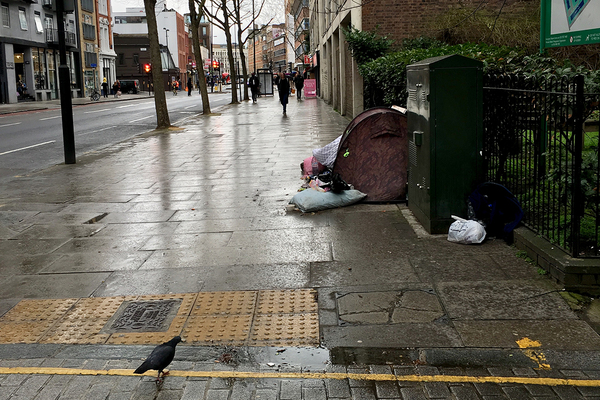Local authority financial pressures could limit success of homelessness reforms, Welsh sector bodies warn
Financial pressures on local authorities may undermine the success of plans to tackle homelessness in Wales, a group of housing organisations has said.
In its response to a white paper outlining major legislative reform to the country’s homelessness, the Back the Bill coalition – made up of Tai Pawb, Shelter Cymru and the Chartered Institute of Housing (CIH) Cymru – said local authorities and registered social landlords would need more funding to deliver the reforms.
But given the existing financial challenges, it was unclear where this financing would come from, the group said.
“There is a danger that this legislation will place increased pressures on service providers without funding, compromising their ability to deliver,” it said.
“This risks the worst of both worlds – stronger legislation but without the money to deliver, causing friction and letting vulnerable people down.”
The Welsh government recently announced an extra £5m for the Housing Support Grant (HSG), compared with the draft Budget, for homelessness prevention and support. The increase will take the final Budget for 2024-25 to around £220m.
The HSG is a government scheme that funds the majority of homelessness and housing-related support services in Wales.
The Welsh government received 140 responses from a range of local authorities, third-sector bodies and registered social landlords.
The proposed changes would require local housing authorities in Wales to extend their housing support and help people to be rehoused in settled rather than temporary accommodation.
The Welsh government said the risk of homelessness would be tackled at the earliest possible stage as part of its proposals, with responsibility for identification and prevention shared across the public sector.
Eight local authorities agreed the proposals would lead to the increased prevention and relief of homelessness, four disagreed and four were uncertain.
According to an analysis of the responses by Miller Research, local authorities “expressed the greatest concern” over plans to abolish a series of tests, such as the priority need test, and “the perceived gap between the ambition of an inclusive support system and the realities of the housing crisis”.
The sector bodies also warned that the “limited scope” of the reforms would “hinder lasting change”.
“Introducing these changes in the current climate without the wider encompassing right to adequate housing to underpin them could potentially undermine their success,” the group said.
Th coalition added that while it supported the “ambition and aims” of the proposed reforms, “we do not feel these reforms alone will have the desired effect”.
“We would encourage consideration of these changes as part of a wider reform of housing in Wales through incorporation of the right to adequate housing,” it said.
The white paper proposed “a new duty on local housing authorities to help support a person to retain accommodation where the applicant has been helped to secure accommodation… or where accommodation has been offered to and accepted by the applicant”.
“The duty will be to provide such support to the applicant, and/or to any member of their household, as the local housing authority considers is reasonably necessary, having regard to the applicant’s needs and its resources, in order to assist the applicant to retain the accommodation.”
Under the proposals, housing managers will be able to call on other bodies to assist them.
“Where necessary, a local housing authority would be permitted to request support to be provided from other public authorities, including other functions of a local authority,” the white paper said.
Homelessness rose in Wales between 2021-22 and 2022-23. The total number of households assessed as homeless and owed a duty to help secure accommodation increased by 7% year on year to 12,537.
In response, the Welsh government said: “The responses to the consultation are informing a number of proposals for changes to policy and law, as part of our programme for government and co-operation agreement, which contains a commitment to reform housing law and implement the Homelessness Action Group’s recommendation to fundamentally reform homelessness services to focus on prevention and rapid rehousing.
“I would like to thank all those who provided a response to the consultation, including the Children, Young People and Education Committee, and all who attended the events held during the consultation period. We will continue to work closely with all stakeholders, including the expert review panel to develop our approach to end homelessness in Wales.”
Sign up for our Wales newsletter
New to Inside Housing? Click here to register and receive our Wales round-up straight to your inbox
Already have an account? Click here to manage your newsletters












